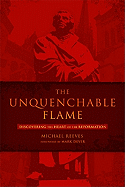Reviewer: Michael Chen
Introduction
I read this overview of the Protestant Reformation¹ two years ago, but it is still one of my favorite Church History books. Scratch that—it’s one of my favorite books, period.
 I revisit it from time to time, and I recommend it avidly. During my secular undergraduate years, I took (and loved!) a “History of the Renaissance and Reformation” course, yet this book taught and benefited me so much more than that course. In short, this book helped me understand the gospel, and it inspires me to trust , treasure and preach the gospel. Moreover, it inspires me to live by and die for the gospel of grace alone.
I revisit it from time to time, and I recommend it avidly. During my secular undergraduate years, I took (and loved!) a “History of the Renaissance and Reformation” course, yet this book taught and benefited me so much more than that course. In short, this book helped me understand the gospel, and it inspires me to trust , treasure and preach the gospel. Moreover, it inspires me to live by and die for the gospel of grace alone.
Three things make this book so helpful for me: its accessibility, its theology, and its lessons for ministry.
____________________
¹For readers unfamiliar with this period of history, it is the period in which the sixteenth century Church (catalyzed unwittingly by Martin Luther) began to rediscover the Biblical gospel: God saves sinners by grace alone, through faith alone, in Christ alone, as revealed in the Scriptures alone, to the glory of God alone. The Unquenchable Flame may be the best book-length introduction to this period’s history and theology.
Many non-Christians have been brave; many have achieved wonderful things; many have spoken out against abuses; and many have died heroic and steadfast deaths for their beliefs. But, as the old saying goes, a good death does not sanctify a bad cause. Moreover, none of the other actions listed makes any individual of perennial relevance to the church. It is only to the extent that they brought God and Christ to bear upon the church of their day that the Reformers have any ongoing relevance for us today².
²Carl Trueman, Reformation: Yesterday, Today and Tomorrow (Fearn, Scotland: Christian Focus Publications, 2011), 20.
Accessibility
One of this book’s greatest strengths is its accessibility. At 208 pages, it is  relatively brief, and the pace moves along briskly. Better yet, the prose is warm, lively and even humorous. Sometimes authorial wit can distract reader’s attention from the story. (For example, I felt such distraction with Eric Metaxas’ Amazing Grace: William Wilberforce and the Heroic Campaign to End Slavery. That book also has plenty of style, but since the author was trying too hard to be funny, some turns of phrase tempted eye rolls.) This book has as much wit as Metaxas’ book. However, it adds to the flow of the storytelling rather than distract from it. I kept laughing as I read this book. In fact, one significant concern about this book is that its details seem too entertaining to be wholly accurate.
relatively brief, and the pace moves along briskly. Better yet, the prose is warm, lively and even humorous. Sometimes authorial wit can distract reader’s attention from the story. (For example, I felt such distraction with Eric Metaxas’ Amazing Grace: William Wilberforce and the Heroic Campaign to End Slavery. That book also has plenty of style, but since the author was trying too hard to be funny, some turns of phrase tempted eye rolls.) This book has as much wit as Metaxas’ book. However, it adds to the flow of the storytelling rather than distract from it. I kept laughing as I read this book. In fact, one significant concern about this book is that its details seem too entertaining to be wholly accurate.
Yet who could fabricate such details? Who could make up Martin Luther’s methods of disposing his enemies’ tracts? (Not to waste them, but to use them to wipe his feces.) Or of Thomas Cranmer concealing his wife in a large box with air holes as they traveled? Or that upon finding a dog urinating concomitantly with himself, Puritan Cotton Mather devoutly “resolved that it should be [his] ordinary practice, whenever [he stopped] to answer the one or other necessity of nature to make it an opportunity of shaping in [his] mind some holy, noble, divine thought”?
And more than funny one-liners, the book highlights some of the most moving moments of Church History. From the dramatic confrontation at Worms between Luther’s conscience and the most powerful man in the world; to a more obscure Puritan sermon which moved the congregation to tears for having neglected the Bible; to Cranmer’s recantation and repentance in flame. There are plenty of reminders that our true faith is not only worth living for and rejoicing over, but it is also worth dying for and weeping over.
Theology
Nevertheless, what gives this book its power is not its humor, eloquence, or even its moving stories, but its theology. And this is characteristic of the book’s subject itself, the Reformation. As Carl Trueman points out,
In that vein, I was surprised at how this book clarified my understanding of the gospel. For example, its explanation of Luther’s The Freedom of a Christian is worth the price of the book itself, and is worth reprinting in full here:
At the heart of it is a story of a king who marries a prostitute, Luther’s allegory for the marriage of King Jesus and the wicked sinner. When they marry, the prostitute becomes, by status, a queen. It is not that she made her behavior queenly and so won the right to the king’s hand. She was and is a wicked harlot through and through. However, when the king made his marriage vow, her status changed. Thus she is, simultaneously, a prostitute at heart and a queen by status…Thus she can confidently display ‘her sins in the face of death and hell and say, “If I have sinned, yet my Christ, in whom I believe, has not sinned, and all his is mine and all mine is his”.’ This was Luther’s understanding of ‘justification by faith alone’, and it is in that security, he argued, that the harlot actually then starts to become queenly at heart³.
How powerful and revealing is Luther’s (biblical) metaphor! This helps me not only to understand imputation and sanctification but also to feel the glory of  Jesus’ love in these doctrines. And what a helpful distillation from Reeves! I have read Luther’s The Freedom of a Christian, yet Reeves’ paragraph hits my head and heart whereas Luther himself does not.
Jesus’ love in these doctrines. And what a helpful distillation from Reeves! I have read Luther’s The Freedom of a Christian, yet Reeves’ paragraph hits my head and heart whereas Luther himself does not.
Just as helpful are Reeves’ comments on the relationship between salvation and faith. To avoid trusting in the strength of our faith (or despairing at the weakness thereof), “It might be more helpful to describe what Luther discovered as ‘justification by God’s word’ instead of ‘justification by faith’, because it is God’s word that justifies here, not our faith” (51). This captures my experience perfectly. Growing up in an evangelical church, I prayed the “Sinner’s Prayer” several times (just to be sure I did it right, since I risked damnation if I messed it up). Yet how would I know if I had meant it enough? So I kept praying the “Sinner’s Prayer” until I felt more assurance. But it was not until I moved across the country, and my new church taught me to stop looking at my faith and to start looking at God’s objective Word—and especially at the cross—that I felt more permanent relief. I sleep much better at night now.
____________________
³Reeves, Michael. The Unquenchable Flame: Discovering the Heart of the Reformation. (Nashville, TN: B&H Publishing, 2010), 50. Kindle Edition.
Lessons for Ministry
I see the same blind spot in students I minister to. I hope to share Luther’s “justification by God’s word” with them. In fact, Reeves’ book was helpful in diagnosing other spiritual ailments. It was an invaluable discernment when I see my ministerial situations through Reeves’ historical lens and theological analysis. For instance, some of my students admit that they are sinners and that they deserve hell, and they act like this confession merits them heaven. Before his “tower experience,” Luther held similar views. Reeves notes, “This was salvation, not by trusting God’s promise of salvation, but by accepting his damnation. It was salvation by humility” (46).
Furthermore, in our age of strategic ministry planning, the Reformers’ simple reliance on the Bible is refreshing and instructive. Despite their different personalities and emphases, the Magisterial Reformers shared this vision. John Calvin’s first sermon upon his return to Geneva was not “On the  Evils of the Dastardly and Treacherous City Council Members Who Ejected Me”, but simply a continued exposition of the text he had left off three years earlier! And Luther famously said, “I simply taught, preached, and wrote God’s Word; otherwise I did nothing. And while I slept, or drank Wittenberg beer with my friends Philip and Amsdorf, the Word so greatly weakened the papacy that no prince or emperor ever inflicted such losses upon it. I did nothing; the Word did everything” (81). Reeves elaborates: “Luther never believed that he should devise any great programme for spreading the Reformation. He simply wanted to unleash the word of God, and let that do all the work” (57). And this strategy yields long-term dividends, as Ulrich Zwingli shows: “instead of campaigning for change, Zwingli dedicated himself to preaching God’s word. Having primed the people, he would then wait for them to demand the change God’s word requires. The results were not speedy, but they had an almost unique durability even beyond his own death” (71).
Evils of the Dastardly and Treacherous City Council Members Who Ejected Me”, but simply a continued exposition of the text he had left off three years earlier! And Luther famously said, “I simply taught, preached, and wrote God’s Word; otherwise I did nothing. And while I slept, or drank Wittenberg beer with my friends Philip and Amsdorf, the Word so greatly weakened the papacy that no prince or emperor ever inflicted such losses upon it. I did nothing; the Word did everything” (81). Reeves elaborates: “Luther never believed that he should devise any great programme for spreading the Reformation. He simply wanted to unleash the word of God, and let that do all the work” (57). And this strategy yields long-term dividends, as Ulrich Zwingli shows: “instead of campaigning for change, Zwingli dedicated himself to preaching God’s word. Having primed the people, he would then wait for them to demand the change God’s word requires. The results were not speedy, but they had an almost unique durability even beyond his own death” (71).
Almost as passing asides, this book also provides smaller insights for life and ministry. It provides observations of how our forefathers wrestled with living out their faith. It also shows how separation may be necessary where core values are not shared. Reeves writes, Luther learned that “if Rome held the pope to be an authority above Scripture, she could never be reformed by God’s word” (45). It shows how Luther’s sola fide gave him boldness and energy to stand against this world with devils filled. It also shows that to impact other geographies and times requires training other preachers, as did Zwingli and Calvin.
Conclusion
Upon my first reading of this book, amidst the bathroom jokes, pathos, and ministry lessons, these two elements struck me most: Luther’s prostitute metaphor and his “justification by God’s word.” And these concerns still form the heart of what I love about this book. But upon my second reading, Reeves’ final chapter took on a new interest. This chapter shares a title with Mark Noll and Carolyn Nystrom’s book Is the Reformation Over?: An Evangelical Assessment of Contemporary Roman Catholicism. It might be seen largely as a response to Noll and Nystrom. One of Reeves’ most brilliant insights is his connection of our age with the spirit of Erasmus, who said, “The sum of our religion is peace and unanimity, but these can scarcely stand unless we define as little as possible” (187). Let us “define as little as possible”? This astounds me! Yet this charge may be true; in his foreword to this book, Mark Dever cites an Episcopalian bishop as saying, “If you must make a choice between heresy and schism, always choose heresy” (10). I am aware that young, rabid Reformation fans may be uncharitable and divisive over minutiae, so I have especially striven to be a kind, relaxed Calvinist and to keep a sense of proportionality over the relative theological significance of various issues. Yet surely the gospel is the most important issue, even in the sometimes precarious balancing act between truth and unity! It may not be fashionable to quibble over whether justification is by “faith plus” or by “faith alone,” but it makes a world of difference, as Reeves cogently reminds us.
In my student ministry, I like to ask students, “If God were to ask you, ‘Why should I let you into My heaven?’ what would you tell Him?” And I hear  things like, “Umm, I go to church and I believe in God and I accepted Jesus when I was in first grade.” And I hear the difference between “faith plus” and “faith alone,” and the dangers of placing faith in one’s prayers more than in one’s Savior, and I remember how anxious this made me. And so I start to tell them a story: “You know, a while ago, there was a guy named Martin Luther, and he did stuff like that, too.” And I tell them about a man who discovered that, though he was incredibly religious, he was actually a spiritual prostitute. I tell them about a man who discovered that he could be simul iustus et peccator, a man who could be justified once for all time by God’s word and not by his AWANA badges. And as I tell his story, it is my story, and I hope it becomes their story. And I am thankful for men like Michael Reeves who have done so much to bring this story to my life and ministry.
things like, “Umm, I go to church and I believe in God and I accepted Jesus when I was in first grade.” And I hear the difference between “faith plus” and “faith alone,” and the dangers of placing faith in one’s prayers more than in one’s Savior, and I remember how anxious this made me. And so I start to tell them a story: “You know, a while ago, there was a guy named Martin Luther, and he did stuff like that, too.” And I tell them about a man who discovered that, though he was incredibly religious, he was actually a spiritual prostitute. I tell them about a man who discovered that he could be simul iustus et peccator, a man who could be justified once for all time by God’s word and not by his AWANA badges. And as I tell his story, it is my story, and I hope it becomes their story. And I am thankful for men like Michael Reeves who have done so much to bring this story to my life and ministry.

Leave a Reply